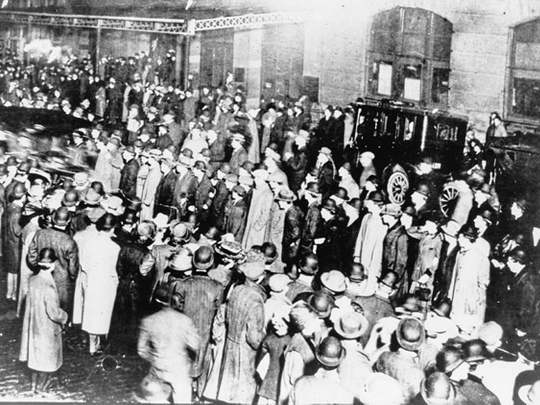
Dubai: It's a secret that almost went down with the Titanic: How scores of Arabs perished or survived the ship's tragic maiden voyage and sinking in 1912.
But the secret is being partially told a century after Titanic's watery demise thanks to some researchers and to the Palestinian-American journalist and writer Ray Hanania, who today feel so disappointed for not answering that question in the first half of the last century which was a "bigger tragedy than Titanic itself".
"Their stories should have been told then to the whole world," Hanania said. But almost 85 years after the accident, he himself started narrating their untold stories.
Hanania's interest with Arabs on board the Titanic goes back to 1997, when he was forced into watching the epic movie Titanic with his wife. While watching the blockbuster movie directed by Oscar-winner James Cameron, Hanania attention was drawn to a dialogue in a scene.
As passengers in the third-class cabins were fighting to get clear of steerage, there was a cry of "yalla" — or "come on" in Arabic.
"For an Arab-American, any thing [related to an] Arab hits you really hard," Hanania told Gulf News.
"For many in the theatre it meant nothing, but to me it meant — Wow! There were Arabs on board and how come I never heard about them before, since I have spent my entire life searching the role of Arab people not only in US but also in the Western culture," he said.
‘Yalla moment'
Until that moment, it was the only reference that "woke me up", he said.
Hanania was content with what he had seen or heard while watching the movie. A second reference struck him shortly.
"When I was leaving the theatre, I saw names displayed of each and every person who was on board the Titanic. I looked at the names and could right away easily recognise 79 [Arabic] names," he added.
Hanania scrutinised the list over and over again before concluding that there were at least 80 Arabs among the ill-fated passengers. He watched the movie several times to make sure he had not missed anything and analysed the two-second "yalla" moment in the nearly three-and-half hour movie.
He was "shocked", "disappointed" and "amazed" since no researchers had earlier mentioned anything about the Arab passengers.
"To me, it was a bigger tragedy than sinking [of the ship]. It was more tragic because I thought [part of] the Arab culture was lost. We lost something. We lost the opportunity to get our story. How many Arabs on board the Titanic were heroes? How many Arabs went out of their way to save people? We never heard any of that," Hanania said. "That story more than any other story connects the Arab people with the American people," he added. If any proof of Arabs on board the Titanic had been revealed in the 1950s or 1960s, there would have been a bigger chance that survivors, their descendants or relatives would have been interviewed. Today, it seems a "huge" task to conduct research of this magnitude.
But, Hanania said, everybody wanted to avoid the "hassle" of talking about the Arab passengers in modern history, especially after the 9/11 terror attacks in the US. Since the revelation that Arab passengers had been on board the Titanic, several jokes and comments have been made on the findings. One of comment was "…that's why it [Titanic] sunk", and "…‘the terrorists' are to blame for the sinking of the ship", Hanania said.
A year after the Titanic movie was released, Hanania — whose family migrated to the US early last century — did a lot of research using books and newspaper articles before documenting his findings.
In his column Arabs on Titanic: We Share the Pain But Not the Glory written in 1998, Hanania reviewed every name on the passenger, crew and business lists and could identify 79 names that were of Arab heritage. The ship had 2,224 passengers and crew who sailed the maiden voyage. There were only 706 survivors. Judith Geller, in her book Titanic: Women and Children First published in October 1998, writes that there "officially were 154 Syrians on board the Titanic and 29 were saved: four men, five children and 20 women". She cited newspaper accounts which suggested that the small village of Kfar Mishki in the Bekaa Valley of Eastern Lebanon was "devastated by the loss of at least 13 of its inhabitants". The village has a majority of Roman Orthodox Lebanese.
Easier to emigrate
Hanania said it is difficult to "identify precisely" the origin of the Arab passengers, and how many came from where exactly. Also, all people arriving at the United States from the Levant were called "Syrians". However, many people on the ship were Christian Arabs and Hanania has an explanation for that.
"It was much easier for a Christian Arab to immigrate to another country than an Arab Muslim because the Christian Arab would immigrate with the sponsorship of a church. It [the church] would have helped them getting paperwork, visa, etc."
After Hanania's article was posted on the internet, along with the names of the 79 Arabs on the ship, he said he received many emails from people saying they were relatives and descendants of the Arabs on board the Titanic. Their relatives' names were "very strong American sounding or western sounding names".
The western sounding names are another factor for not being able to exactly specify the number of Arab passengers.
According to Hanania it would have been "nice" to talk to the descendants of the passengers, but the purpose of telling their story was not as clear as of today.
Now, when Arab-Americans look back, they realise they want to, "tell the American people, we suffered just like you. We died on the Titanic just like you. We were immigrants just like you. They would look at us, and say Oh, you are just like us."













